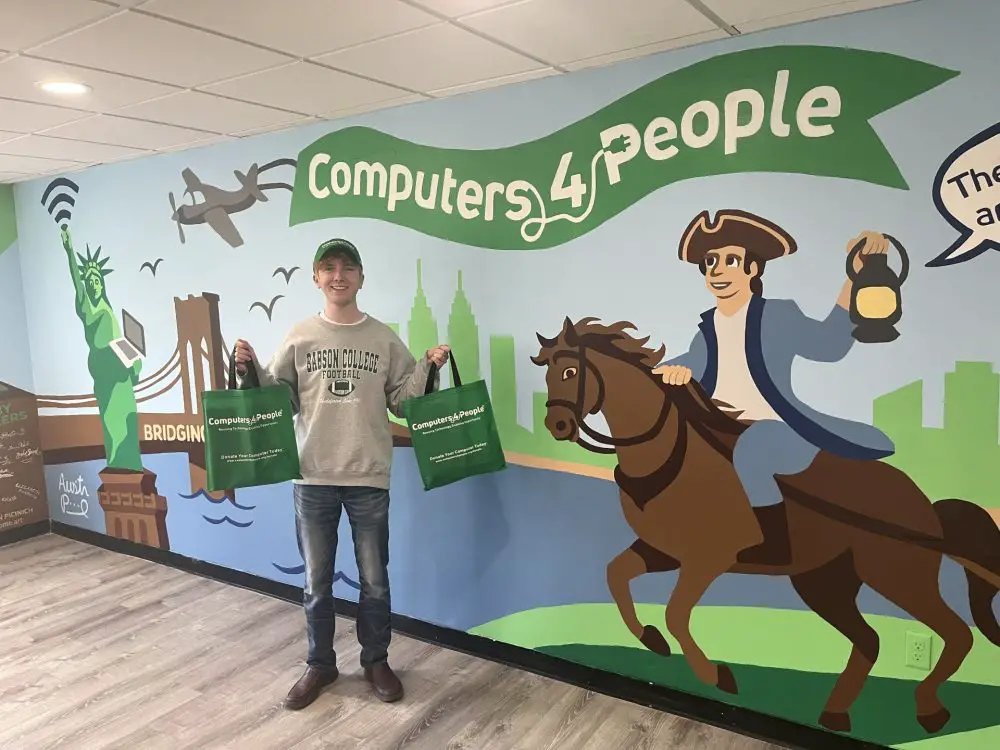Babson student’s Computers4People is bridging Digital Divide, promoting sustainability
Lots of Babson College students launch businesses while at the school or shortly after, but rising senior Dylan Zajac got a serious head start with Computers4People.
He hatched this feel- and do-good nonprofit at home five years ago, when he was just 15. Though he has taken the organization to a totally new level since then in putting thousands of donated computers and other electronic devices into the hands of those who need them.
Computers4People provides computers and other electronics to students, seniors, refugees, formerly incarcerated people, veterans, and more, while keeping the gear out of landfills. In some cases, the equipment is paired with services. For example, one project involves giving 100 computers to veterans, and having high school students provide instructions on basic skills.
“When people think of computer donations, a lot of times they think of students. But most of our devices actually go to people over the age of 18, many who have barely touched a computer before,” Zajac said. “We focus on the devices and using them. A computer is just a brick if you don’t know how to use it.”
The Hoboken, N.J. native has been operating Computers4People out of New Jersey at an office that serves that state and New York, but this spring opened an office in Waltham where I visited him for an interview—his most glamorous media opportunity since appearing on The Kelly Clarkson Show last fall. Zajac scored a $5,000 donation from that show for his organization.
I’m hoping our coverage might pay off for Computers4People, too, in attracting donations, volunteers, and other support.

A local presence
Zajac was still putting the office together when I swung by in mid-May, though he was delighted about high quality furniture donated by a biotech firm and was happy to pose for photos in front of a colorful mural that adds some fun to the workspace. Now with two offices, Computers4People has come a long way from its start in Zajac’s bedroom, and then a storage unit.
For locals, the Waltham office is a place where you can bring old electronics, or you can contact Computers4People and they will pick them up. The outfit keeps a running tally on its website of all that has been collected—nearly 3,000 computers, 45,000 pounds of e-waste recycled, and about 1.5M hours of internet access as of when I wrote this post. If Computers4People can’t repurpose donated items, it has partners downstream that can tear the gear apart for recycling purposes.
Laptops are most in demand by the non-profit, and the newer the better. At the time of our interview, Zajac said he had a waiting list of 500 people with low incomes in the New Jersey-New York area.
Zajac has tapped his school, Babson, for 300 donated computers, and is also connecting with other schools and organizations willing to part with surplus equipment.
He’s also spoken with Superintendent Jamie Manzolini from the Wellesley Recycling & Disposal Facility to discuss ways to work together (Manzolini told me he is leery about just handing over donated items to entities outside of the RDF’s established recycling partner, but is open to the Computers4People promoting itself at the RDF through flyers, etc., to encourage people to donate items directly to it.)
“We’re starting from ground zero here and are looking to build up our supply,” Zajac said. “We’re looking for partners that could be drop-off spots. Libraries, local businesses, and other places willing to help. We’ll take any electronics up to a microwave… we’re not looking for those.”
The student also credits classmates from Babson for supporting the cause. One recent grad is handling social media content.
Zajac has made a splash at Babson with Computers4People by winning a prestigious pitch competition. He also points to a class called “Grow your Existing Venture” taught by Prof. Mary Gale that involved 15 students with their own businesses sharing updates and advice during class, with access to speakers and alumni, and ending with a pitch to investors at the end. Students from that class helped with the Waltham office move-in.
The Waltham office is designed to handle all of Massachusetts eventually. A grant from the Mass Broadband Institute is funding 1,500 computers over the next 20 months to be donated through more than two dozen nonprofits in the metro north area (Cambridge on up). Computers4People is partnering with MassHire Metro North and its Digital Jedi Consortium, and is optimistic about qualifying for other grants.
“We’re in a good spot right now, especially in the digital equity sphere,” Zajac said, adding that the federal government has released $2.75B for digital equity across the country, with each state getting a cut. “Hopefully we’re building up enough capacity to receive some of that funding and to use it to 10x its impact.”
Computers4People has been raising funds itself too, including at a successful 5th anniversary party in May.
What’s next?
Zajac plans to remain heavily involved in Computers4People after he graduates next year. But he’s also working to make the organization sustainable without him, and thinks he can achieve that within six months.
The entrepreneur has a vision for Computers4People going national and global.
Asked what aspects of running the organization interest him most, Zajac said expanding programs and automating processes are at the top of his list. “We’re building a bunch of tech to track who donates computers and who receives them to understand the impact of those donations from people’s education to job searches,” he said.
Wellesley’s Betsy Komjathy, a consultant with the Babson College Speech Center and adjunct lecturer on business presentations, summed up the value of Computer4People when she introduced us to Zajac and his organization: “Computers4People is doing remarkable things for people and the planet.”